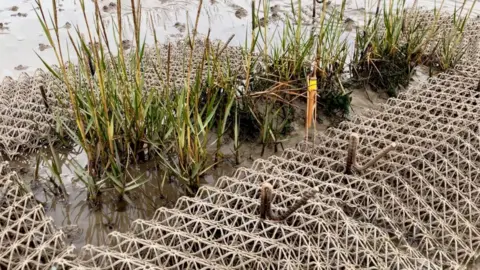Chip factory waste 'could regenerate' salt marshes
 BBC
BBCSome of the waste produced while making crisps and chips is helping to protect and regenerate vulnerable salt marshes.
Conservationists are using grids made from potato starch, along with ropes and willow, to boost plants suited to living in salt marshes.
The UK Centre for Ecology & Hydrology said 85% of England's salt marshes had been lost since 1860.
Lancashire's can be found at Hest Bank, Bolton-le-Sands and Jenny Brown's Point.

Salt marshes, as well as helping to prevent flooding nearby, provide unique habitats for birds, fish and some rare plants.
The Our Future Coast project is led by Wyre Council and managed by Lancaster City Council with assistance from the environmental group the Morecambe Bay Partnership.
Joseph Earl, of the Morecambe Bay Partnership, said the new grids "essentially try to trap sediment and encourage growth".
He said the grids were environmentally friendly since "the crucial thing is that they will biodegrade over a long period of time".
Mr Earl said: "Salt marshes help to absorb wave energy, they help to reduce the risk of flooding and storms, so the bigger picture is to try and restore the marsh and allow that safety net to re-establish."

The grids, manufactured in the Netherlands by BESE, have been used successfully in Australia and the United States.
Lancaster City Council project manager Eleanor Brown said: "Success in the short term is that the BESE grids end up being covered in sediment, at which point they will biodegrade.
"That will be enough for colonising plants to take hold and start to grow."
Listen to the best of BBC Radio Lancashire on Sounds and follow BBC Lancashire on Facebook, X and Instagram. You can also send story ideas to [email protected] and via Whatsapp to 0808 100 2230.
